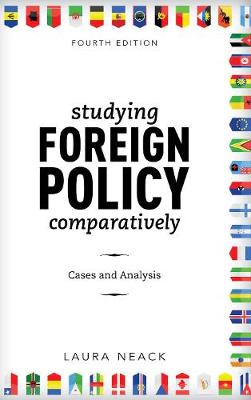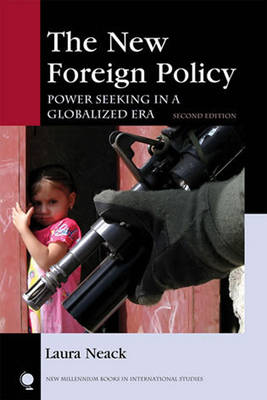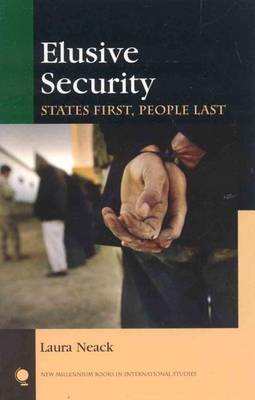New Millennium Books in International Studies
3 total works
What is foreign policy? What do we know about why states pursue certain foreign policies and not others? What factors go into the shaping of foreign policy? Studying Foreign Policy Comparatively, Fourth Edition (formerly titled The New Foreign Policy), answers these questions, and more, by exploring how scholars analyze foreign policy and by applying this knowledge to new foreign policy cases.
Benefits of the fourth edition:
*Every chapter is devoted to a distinct level in the levels-of-analysis approach
*Provides easy-to-understand explanations and demonstrations of policy models and theories
*A mixture of current and historical cases from around the world extends students' knowledge of foreign policy and understanding of contemporary problems
*New cases include the refugee crisis in Europe, rising populism and anti-immigrant coalition governments, Russian use of media, and China's Belt and Road Initiative
Benefits of the fourth edition:
*Every chapter is devoted to a distinct level in the levels-of-analysis approach
*Provides easy-to-understand explanations and demonstrations of policy models and theories
*A mixture of current and historical cases from around the world extends students' knowledge of foreign policy and understanding of contemporary problems
*New cases include the refugee crisis in Europe, rising populism and anti-immigrant coalition governments, Russian use of media, and China's Belt and Road Initiative
A third edition of this book is now available. In this cogent text, Laura Neack argues that foreign policy making, in this uncertain era of globalization, global violence and American hegemony, revolves around power seeking and power maintenance. Now in a thoroughly revised and updated edition with concise, accessible chapters, the book reviews both old and new lessons on foreign policy making and behavior using a rich array of new and enduring case studies. Following a levels-of-analysis organization, the author considers the many elements that influence foreign policy.
Topics include realist theories on rational actors and the pursuit of national interests; studies of leaders' cognition, beliefs and learning; the relationships between leaders and autonomous governmental groups that influence foreign policy making; the shaping influence of national self-image and culture on government institutions and policies; the so-called democratic peace and how democratization may lead to war; the impact of domestic political debates and political opposition on foreign policy choices; the controversial roles of public opinion and the media; how great powers are expected to behave in foreign affairs and how non-great powers may find openings for foreign policy independence; and the impact of non-state actors on the foreign policies of states.
Topics include realist theories on rational actors and the pursuit of national interests; studies of leaders' cognition, beliefs and learning; the relationships between leaders and autonomous governmental groups that influence foreign policy making; the shaping influence of national self-image and culture on government institutions and policies; the so-called democratic peace and how democratization may lead to war; the impact of domestic political debates and political opposition on foreign policy choices; the controversial roles of public opinion and the media; how great powers are expected to behave in foreign affairs and how non-great powers may find openings for foreign policy independence; and the impact of non-state actors on the foreign policies of states.
This clear and concise text offers a comprehensive comparison of national, international, and human security concepts and policies. Laura Neack argues that security remains elusive because of a centuries-old ethic insisting that states are the primary and most important international actors, can rely ultimately only on themselves for protection, and must keep all options on the table for national security. The author compellingly demonstrates how a state-first security ethic ultimately fails to secure states, the international community and-most important-human beings.
Although security as a concept can be widened to include almost any aspect of existence, Neack focuses especially on security from physical violence, beginning with efforts by states to defend themselves against violent attack. She explores such topics as the internal and external dimensions of security, terrorism, and defending the homeland; threat perception and responses; preemptive and preventive wars; and other military interventions. Next, Neack examines efforts over the past century to protect states through the construction of the United Nations international security system and how collective security, peacekeeping, and peace enforcement have been used in that system. Throughout, Neack shows that human security has only mattered in terms of servicing the state's security needs, a critique she takes up directly in the final chapters. A range of short and extended case studies are offered to illustrate the conceptual materials and policy debates over security. In this state-first world, we only can choose between degrees of insecurity; true security remains elusive.
Although security as a concept can be widened to include almost any aspect of existence, Neack focuses especially on security from physical violence, beginning with efforts by states to defend themselves against violent attack. She explores such topics as the internal and external dimensions of security, terrorism, and defending the homeland; threat perception and responses; preemptive and preventive wars; and other military interventions. Next, Neack examines efforts over the past century to protect states through the construction of the United Nations international security system and how collective security, peacekeeping, and peace enforcement have been used in that system. Throughout, Neack shows that human security has only mattered in terms of servicing the state's security needs, a critique she takes up directly in the final chapters. A range of short and extended case studies are offered to illustrate the conceptual materials and policy debates over security. In this state-first world, we only can choose between degrees of insecurity; true security remains elusive.


